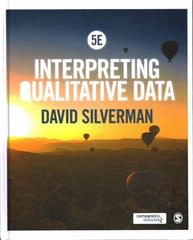Question
Purpose : By exploring the processes that contribute to aggression in a context as familiar to most as that of road rage, you will see
Purpose:
By exploring the processes that contribute to aggression in a context as familiar to most as that of road rage, you will see how social psychology tells us something about our everyday lives. And, hopefully, you will remember this the next time you find yourself overly angry at the behavior of strangers.
Post (Due Friday by 11:59 pm CST):
Before compose your post, make sure you've read this week's required readings, specifically "How to keep your head from exploding in Seattle trafficLinks to an external site.." https://www.seattletimes.com/pacific-nw-magazine/how-to-keep-your-head-from-exploding-in-seattle-traffic/ After reading, complete your discussion post by defining five of the seven following concepts. For each concept, quote at least one section of the article that illustrates the concept, and explain how it does so.
- Deindividuation
- Fundamental attribution error
- Self-serving bias
- Outgroup homogeneity bias
- Sympathetic nervous system arousal
- Observational learning
- Long-term effects of stress
To conclude your post, identify at least one intervention discussed in the article and describe how you might encourage an aggressive driver you know (perhaps even yourself!) to implement that intervention. Discuss what is likely to make an intervention effective versus ineffective.
Step by Step Solution
There are 3 Steps involved in it
Step: 1

Get Instant Access to Expert-Tailored Solutions
See step-by-step solutions with expert insights and AI powered tools for academic success
Step: 2

Step: 3

Ace Your Homework with AI
Get the answers you need in no time with our AI-driven, step-by-step assistance
Get Started


